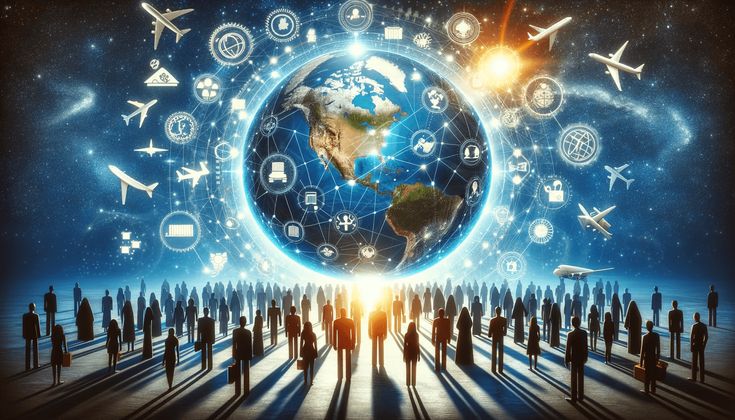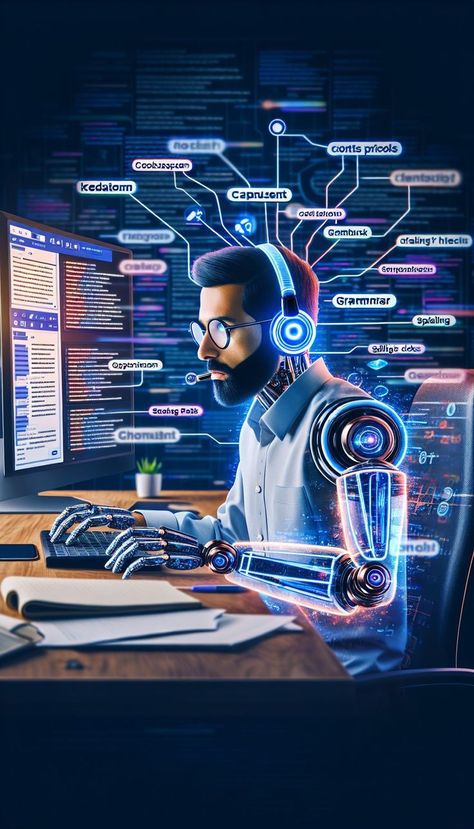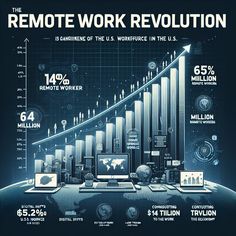Table of Contents
Published: March 31, 2025 | By WorldAffair.org
As we step further into 2025, Artificial Intelligence (AI) is no longer just a technological tool—it has become a strategic asset in the world of geopolitics. Nations are increasingly leveraging AI to gain an upper hand in economic dominance, military power, and global influence. From AI-driven trade agreements to military innovations and economic policies, AI is reshaping the global power structure, with profound implications for international relations and security.
In this blog post, we explore how AI is influencing geopolitics in 2025, its role in international relations, and how countries like the U.S., China, and the European Union are using AI to strengthen their global influence. We will also discuss the challenges that come with this technological revolution and the need for ethical governance in AI’s deployment.

💻 AI: The New Tool for Geopolitical Power
AI has become a tool for both soft power and hard power. From its impact on military strategies to its influence on trade negotiations, AI is increasingly shaping global diplomacy and the distribution of global power.
1. Military AI: The Future of Warfare
In 2025, AI is at the heart of modern warfare. Nations are incorporating AI into their military systems, creating more efficient and autonomous defense mechanisms. AI’s role in military technology has dramatically increased, with countries now using it for everything from autonomous drones to cyber warfare.
- Autonomous Weapons: Countries like the U.S. and China are racing to develop autonomous weapons powered by AI that can make decisions in real-time, reducing human involvement and increasing the speed of operations. This shift could change the nature of warfare, making conflicts faster and more unpredictable.
- AI in Cybersecurity: The cybersecurity landscape is being transformed by AI, with AI-powered systems capable of detecting threats and responding in real-time. This has led to AI-driven cyberattacks, raising concerns about the future of international cybersecurity norms.
By 2025, AI-based military technologies will significantly influence the global balance of power, with countries that lead in AI research gaining an advantage on the battlefield and in cybersecurity.

2. AI in Trade and Economic Power
As AI transforms global economies, it is becoming an integral part of international trade. Nations are using AI to enhance economic policies, boost productivity, and optimize supply chains. AI has the potential to redefine global trade relations, giving those who master the technology an economic edge.
- AI and Trade Agreements: Countries are increasingly incorporating AI into trade agreements to make them more efficient. AI can automate trade negotiations, predict market trends, and optimize logistics networks, ensuring faster and cheaper trade.
- AI in Economic Planning: AI is being used for economic forecasting, allowing countries to better anticipate market trends and make data-driven policy decisions. This is particularly beneficial in sectors like energy, manufacturing, and agriculture, where AI-driven efficiencies lead to increased production and reduced waste.
Nations that harness AI to improve their economic systems will gain a significant competitive advantage in global trade. The U.S., China, and the European Union are leading this push, each using AI in different ways to shape their economic futures.

🌏 Global AI Rivalry: U.S., China, and the European Union
As of 2025, the U.S., China, and the European Union are the primary players in the global AI race, each with its own vision and strategy. Their differing approaches to AI will play a critical role in determining the future of global geopolitics and economic power.
The United States: Leading in Innovation
The United States has long been a leader in AI innovation, particularly in private sector advancements. With companies like Google, Microsoft, and IBM driving AI research, the U.S. continues to lead the way in AI development. However, the U.S. is also focusing on developing AI for defense and cybersecurity, ensuring it maintains its technological edge in military and economic power.
- AI in Defense: The U.S. is investing heavily in AI to enhance its military readiness, creating autonomous systems that could be deployed globally for rapid responses.
- AI Governance: The U.S. is also working on developing frameworks for AI regulation and ethics, ensuring AI is used responsibly in both domestic and international contexts.

China: Ambitious AI Goals
China has emerged as a formidable player in the global AI race, with the Chinese government investing heavily in AI as part of its Made in China 2025 initiative. By 2025, China is expected to be a dominant force in AI research, particularly in the fields of AI surveillance and data analysis.
- AI in Surveillance: China has been at the forefront of using AI for public surveillance, with AI-powered facial recognition systems deployed throughout cities. This use of AI raises significant concerns about privacy, but it also gives China an edge in controlling domestic and international security concerns.
- AI in Economic Planning: China is also using AI to drive economic growth, optimizing its manufacturing sector, energy systems, and transportation networks.

The European Union: Focusing on Ethics
While the European Union may not yet match the U.S. or China in AI innovation, it is positioning itself as a leader in ethical AI. The EU is emphasizing AI transparency, privacy protection, and human rights, creating regulatory frameworks for AI that prioritize ethical considerations.
- AI Ethics: The EU is focused on ensuring that AI is used in ways that are fair, accountable, and non-discriminatory, creating a regulatory model that could set global standards.
- Collaborative AI Development: The EU is also fostering collaborative AI research across its member states, ensuring that the technology benefits all countries within the union and supports long-term sustainable growth.

⚖️ Ethical Concerns and Global Governance in AI
As AI continues to shape geopolitics, ethical concerns about its deployment are becoming more pressing. Global governance frameworks for AI regulation and data protection will be essential to ensure that AI technologies are used for the greater good and not just for geopolitical domination.
- International Collaboration: The United Nations and other international bodies are pushing for global standards in AI regulation to prevent misuse and ensure that AI technologies align with human rights and democratic values.
- AI and Human Rights: The integration of AI into military systems, surveillance, and global trade systems raises concerns about human rights violations and the potential for AI to exacerbate inequality. Ensuring that AI development is aligned with ethical principles is crucial for maintaining global stability.

✍️ Conclusion: The AI-Driven Future of Global Geopolitics
AI is set to play an increasingly central role in geopolitics, international relations, and economic power. By 2025, countries that lead the AI race will gain significant advantages in military, economic, and diplomatic spheres. While the U.S., China, and the European Union are leading this charge, global governance frameworks for AI will be necessary to ensure that the technology is used ethically and responsibly.
The AI arms race is just beginning, and its impact on global power dynamics will continue to unfold in the coming years. For businesses and governments, the challenge will be to use AI to promote sustainable growth, security, and global cooperation, ensuring that AI becomes a force for good rather than a source of division.
Author Profile
- Syed Tahir Abbas is a Master's student at Southwest University, Chongqing, specializing in international relations and sustainable development. His research focuses on U.S.-China diplomacy, global geopolitics, and the role of education in shaping international policies. Syed has contributed to academic discussions on political dynamics, economic growth, and sustainable energy, aiming to offer fresh insights into global affairs.
Latest entries
 U.S. Foreign PolicyFebruary 2, 2026AI and Grand Strategy: The Case for Restraint – Navigating the Future of American Power
U.S. Foreign PolicyFebruary 2, 2026AI and Grand Strategy: The Case for Restraint – Navigating the Future of American Power National SecurityJanuary 31, 2026Treating China’s Connected Energy Systems as a National Security Risk
National SecurityJanuary 31, 2026Treating China’s Connected Energy Systems as a National Security Risk Global HealthJanuary 29, 2026The Future of the WHO—and How the United States Can Shape It
Global HealthJanuary 29, 2026The Future of the WHO—and How the United States Can Shape It Global TradeJanuary 22, 2026Trump Cancels Tariffs on European Nations Over Greenland Pursuit?
Global TradeJanuary 22, 2026Trump Cancels Tariffs on European Nations Over Greenland Pursuit?


11 comments
Your home is valueble for me. Thanks!…
Hello! I’m at work surfing around your blog from my new apple iphone! Just wanted to say I love reading through your blog and look forward to all your posts! Carry on the great work!
Excellent website. Lots of helpful information here. I am sending it to several pals ans additionally sharing in delicious. And certainly, thank you to your sweat!
We’re a group of volunteers and starting a new scheme in our community. Your website offered us with valuable information to work on. You have done an impressive job and our entire community will be thankful to you.
I am often to blogging and i really appreciate your content. The article has really peaks my interest. I am going to bookmark your site and keep checking for new information.
It’s laborious to find educated folks on this subject, but you sound like you already know what you’re talking about! Thanks
I truly prize your piece of work, Great post.
You made some nice points there. I did a search on the issue and found nearly all persons will go along with with your blog.
Pretty! This was a really wonderful post. Thank you for your provided information.
Simply a smiling visitor here to share the love (:, btw outstanding design.
**mitolyn**
Mitolyn is a carefully developed, plant-based formula created to help support metabolic efficiency and encourage healthy, lasting weight management.